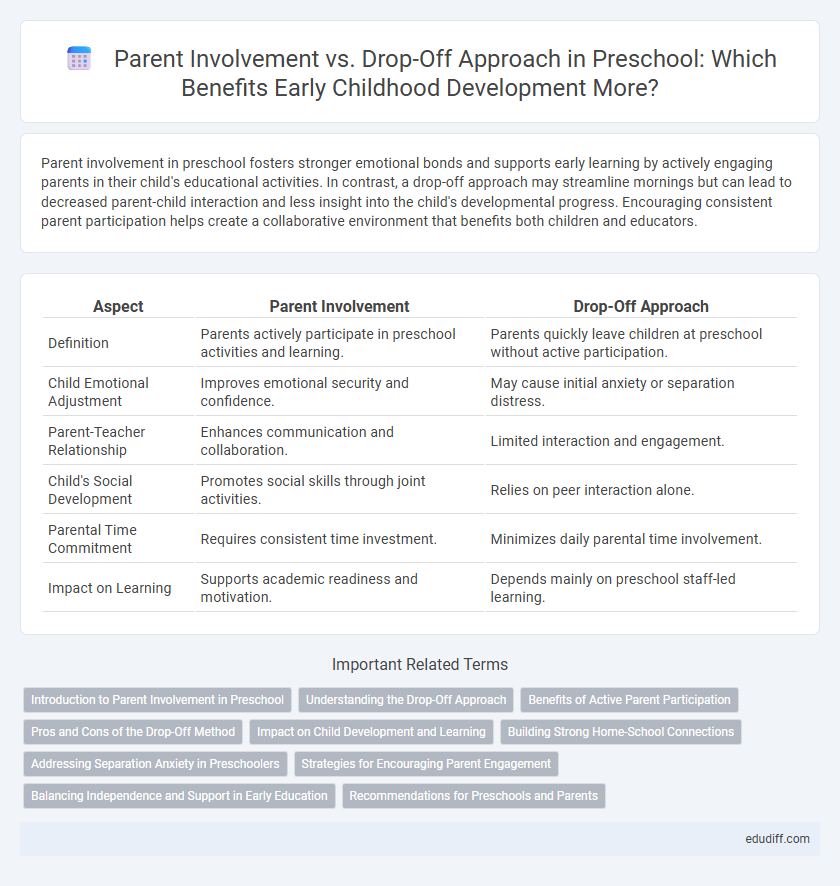Parent involvement in preschool fosters stronger emotional bonds and supports early learning by actively engaging parents in their child's educational activities. In contrast, a drop-off approach may streamline mornings but can lead to decreased parent-child interaction and less insight into the child's developmental progress. Encouraging consistent parent participation helps create a collaborative environment that benefits both children and educators.
Table of Comparison
| Aspect | Parent Involvement | Drop-Off Approach |
|---|---|---|
| Definition | Parents actively participate in preschool activities and learning. | Parents quickly leave children at preschool without active participation. |
| Child Emotional Adjustment | Improves emotional security and confidence. | May cause initial anxiety or separation distress. |
| Parent-Teacher Relationship | Enhances communication and collaboration. | Limited interaction and engagement. |
| Child's Social Development | Promotes social skills through joint activities. | Relies on peer interaction alone. |
| Parental Time Commitment | Requires consistent time investment. | Minimizes daily parental time involvement. |
| Impact on Learning | Supports academic readiness and motivation. | Depends mainly on preschool staff-led learning. |
Introduction to Parent Involvement in Preschool
Parent involvement in preschool significantly enhances early childhood development by fostering strong communication between parents and educators. Active parental engagement supports children's social, emotional, and cognitive growth, leading to improved academic outcomes and a smoother transition into formal schooling. Establishing consistent routines and open dialogue ensures parents contribute meaningfully beyond the drop-off approach, creating a collaborative learning environment.
Understanding the Drop-Off Approach
The drop-off approach in preschool emphasizes fostering children's independence during arrival by encouraging them to separate from parents without prolonged goodbyes, which helps build self-confidence and emotional resilience. This method reduces separation anxiety by establishing consistent routines and trusted caregiver interactions from the outset. Research indicates that children who experience supportive drop-off practices adapt more quickly, facilitating smoother transitions into the preschool environment.
Benefits of Active Parent Participation
Active parent participation in preschool fosters stronger emotional bonds and enhances children's social and cognitive development by creating a supportive learning environment. Engaged parents contribute to consistent routines and reinforce educational activities at home, leading to improved academic performance and positive behavior. Research indicates that children with involved parents exhibit higher self-esteem and adaptability during the transition from home to school.
Pros and Cons of the Drop-Off Method
The drop-off approach in preschool offers efficiency, allowing parents to save time during busy mornings and children to quickly transition into the learning environment. However, this method may lead to heightened separation anxiety for some children and limit opportunities for parental engagement in classroom activities. Balancing the drop-off convenience with strategies to support emotional comfort and communication can improve overall child development and parent satisfaction.
Impact on Child Development and Learning
Parent involvement in preschool significantly enhances child development by promoting emotional security, better language acquisition, and social skills development. In contrast, the drop-off approach often limits opportunities for early attachment and interactive learning, potentially leading to delayed cognitive and social growth. Research shows children with engaged parents demonstrate higher academic readiness and sustained motivation compared to those experiencing minimal parental participation.
Building Strong Home-School Connections
Parent involvement in preschool significantly enhances children's social-emotional development and academic success compared to the drop-off approach, which often limits engagement. Regular communication and collaborative activities between parents and teachers create a supportive learning environment that fosters trust and consistency. Building strong home-school connections encourages shared responsibility for children's growth and reinforces positive behaviors both at home and in the classroom.
Addressing Separation Anxiety in Preschoolers
Active parent involvement during preschool drop-off significantly reduces separation anxiety in young children by fostering a secure and comforting environment. Teachers and caregivers who engage parents in daily routines and provide clear communication help ease transitions, promoting emotional stability and confidence. Structured drop-off strategies that include brief, consistent goodbyes and emotional reassurance further support preschoolers in adapting smoothly to separation.
Strategies for Encouraging Parent Engagement
Effective strategies for encouraging parent engagement in preschool include creating welcoming environments, offering flexible meeting times, and providing regular updates on child progress through digital platforms. Utilizing parent workshops focused on child development and interactive activities enhances connection and investment in the learning process. Building strong communication channels between educators and families fosters trust and encourages collaborative participation in early childhood education.
Balancing Independence and Support in Early Education
Encouraging parent involvement in preschool fosters a supportive learning environment that enhances children's social and emotional development. Implementing a balanced drop-off approach promotes independence by allowing children to explore and adapt to new settings while still feeling secure. Integrating both strategies optimizes early education outcomes by empowering children to build confidence and resilience.
Recommendations for Preschools and Parents
Preschools should foster parent involvement by creating regular communication channels, offering workshops that educate parents on developmental milestones, and organizing family engagement activities to strengthen home-school connections. Encouraging parents to participate in classroom experiences and decision-making processes enhances children's emotional security and learning outcomes. Parents are recommended to balance supportive presence with independent drop-off routines that promote children's autonomy while maintaining open dialogue with educators.
Parent Involvement vs Drop-Off Approach Infographic

 edudiff.com
edudiff.com